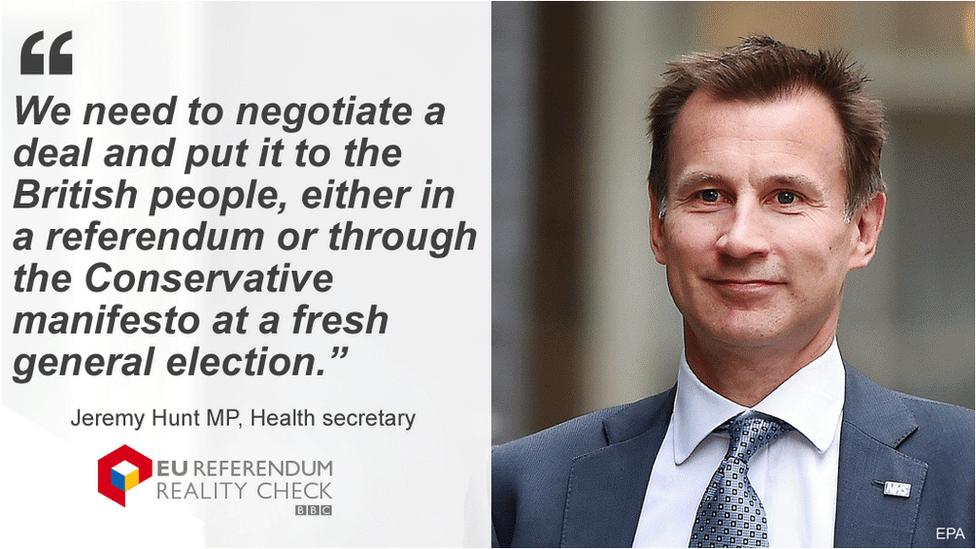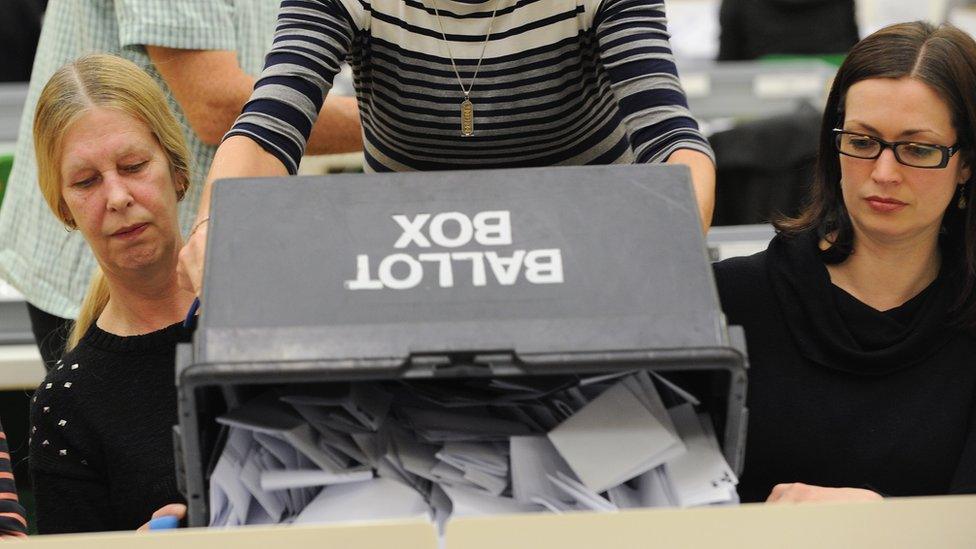Reality Check: Could there be a second referendum?
- Published

The claim: There could be another referendum on the UK's relationship with the European Union.
Reality Check verdict: A second referendum on the UK's membership of the EU seems both unlikely to happen and unlikely to give a different result to the first one. A referendum on the deal reached for leaving the EU is possible but not required by current legislation.
Since last week's referendum on the UK's membership of the European Union, there has been much talk of a second referendum.
It is not the first time it has been mentioned.
Actually, it was discussed much earlier in the campaign with Michael Howard suggesting in February that a vote to leave could "shake EU leaders out of their complacency" and lead them to offer the UK a better deal to persuade the country to stay.
There has been no sign of that happening so far.
But second referendums have been in the news - Nicola Sturgeon wants a second referendum on Scottish independence, and it has been less than two years since the last one.
It would not be the first time there has been a second referendum when the population of a member state has voted against the EU.
In Denmark, a second referendum was held after voters rejected the Maastricht Treaty.
A deal was done giving the country an optout of the euro and home and justice affairs, and the second referendum passed.
In Ireland, a second referendum was held after the original referendum had rejected the Nice Treaty.
Again, concessions were made and the second vote passed.
Ireland also had two votes on the Lisbon Treaty.
In each case, the unanimous approval of EU members had been needed for treaty changes, so the whole process would have stalled if the referendums had not passed.
That is not the case with the UK's decision.
The referendum in the UK was, strictly speaking, only an advisory one.
Tottenham MP David Lammy has said that people could "stop this madness through a vote in Parliament", and there has been a big petition calling for another referendum.
But Dr Simon Usherwood, from the think tank UK in a Changing Europe, says that if there was a second referendum, it would annoy the electorate and make people more likely to vote to leave.
"The public would also very likely take a second vote... as a mark of bad faith, and would respond accordingly," he says.
"Rather than avoiding Brexit, it would simply harden the decision."
In a post-referendum poll by ComRes, external, 92% of leave voters said they were happy with the outcome, while 4% of remain voters were happy (and, overall, 7% were indifferent).
MPs have rushed to say the democratic process must be respected and the UK must leave the EU, among them Health Secretary Jeremy Hunt.
But Mr Hunt wrote in Tuesday morning's Daily Telegraph newspaper that there would need to be a vote on the terms on which the UK leaves.
"We need to negotiate a deal and put it to the British people, either in a referendum or through the Conservative manifesto at a fresh general election," he wrote.
Mr Hunt is talking about having this vote before the UK triggers Article 50, which begins the process of the UK leaving the EU.
That would mean waiting for a new prime minister to take over, negotiating a deal on the UK's trade relationship with the EU and, then, holding either a referendum or a snap general election, or indeed waiting for the scheduled one in May 2020, before triggering Article 50.
And bear in mind that German Chancellor Angela Merkel has said there cannot be any discussions of the terms of the UK's deal before Article 50 has been triggered.
Whether there has to be a referendum on the deal with the EU will be a matter for Parliament and the next prime minister, but the current legislation does not require there to be one.
The European Union Act 2011, external "ensures that if in the future there is a proposed treaty change or decision in the existing treaties that moves a power or an area of policy from the UK to the EU, the government will require the British people's consent in a referendum before it can be agreed", but the negotiations are unlikely to move power in that direction.



- Published26 February 2016

- Published22 February 2016
